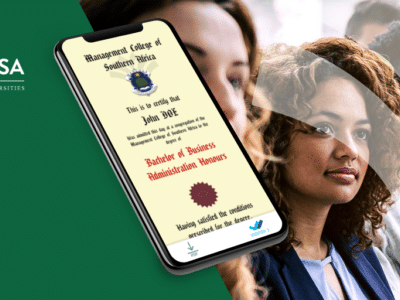Unlocking the Secrets of Master of Commerce: A Journey to Opportunity
A Master's in Commerce is the ideal solution for ambitious people who want to advance their careers. This programme not only teaches them specialised skills and enhances their abilities but also opens the door to vast career opportunities. MANCOSA offers a Master of Commerce course that equips students with in-depth knowledge of their chosen fields. In this article, we'll talk about this degree programme and its job opportunities. We'll also cover admission requirements and where you can study.

What is a Master of Commerce?
A Master of Commerce (MCom) is a postgraduate degree focusing on advanced studies in commerce, accounting, economics, marketing, finances, business strategy, and other fields.
It’s designed to give students specialised knowledge in different areas of business and commerce and can take one to two years to complete.
After obtaining an MCom, graduates can pursue several careers, including jobs in banking, accounting, academia, consulting, and more. Some of these careers, including business analysis and risk management, are among the 20 highest-paying careers in South Africa.
What can I do with an MCom qualification?
Here’s a list of 11 careers you can pursue with an MCom degree.
1. Treasury Manager
Treasury managers manage a company’s financial resources, including liquidity, cash management, investments, and debt.
They’re responsible for the following:
- Managing cash flow and liquidity to make sure the company has adequate funds
- Develop and implement cash management methods
- Investigate excess cash to improve return
- Develop and implement treasury policies
2. Forensic Accountant
Forensic accountants are responsible for investigating financial records to uncover fraud or irregularities.
They use their analytical, accounting, and investigative skills to examine financial data and present their findings.
Their work often involves the following:
- Track funds and assets to uncover fraud
- Interview witnesses and gather evidence
- Prepare forensic accounting reports
- Provide expert testimonies at legal proceedings
3. Management Accountant
Management accountants work for different companies, including private, public, and government agencies.
They’re responsible for recording numbers for internal review to help companies budget effectively and make strategic decisions.
Some of their responsibilities include the following:
- Develop budgets and forecasts
- Conduct financial audits
- Assist in strategic planning
- Provide cost analysis reports
4. Investment Banker
Investment bankers facilitate financial transactions for companies and individuals, including mergers and acquisitions, debt and equity insurance, and more.
Their work may include the following:
- Conduct financial analysis and due diligence
- Create financial models
- Negotiate deals
- Advise clients on the best investment opportunities
- Manage relationships with investors and clients
5. Financial Analyst
Financial analysts assess businesses’ economic performance to provide advice and recommendations to investors, individuals, and companies.
They’re generally responsible for the following:
- Analyse financial statements and metrics
- Conduct market research to determine trends and opportunities
- Monitor economic and financial market conditions
- Help professionals and individuals make smart financial decisions through data analysis
6. Financial Planner
Financial planners help families and individuals manage their finances better to achieve their financial goals and save for education or retirement.
Their job includes the following responsibilities:
- Assess the client’s financial situation and goals
- Develop financial plans and adjust them as needed
- Stay up to date with financial regulations
- Build and maintain relationships with clients
- Educate clients on financial matters
7. Tax Consultant
Tax consultants provide expert advice to clients regarding their taxes. They assist businesses and individuals with their tax-related matters to ensure compliance.
Some of their primary responsibilities include the following:
- Conduct tax planning and analysis
- Resolve tax disputes
- Prepare and file tax returns for clients
- Guide clients on tax implications
8. Business Analyst
Business analysts examine businesses’ financial situations to determine ways to improve their economic position and efficiency. They look at processes, systems, and data to identify these opportunities.
Their job may involve the following tasks:
- Gather and analyse information
- Document business systems and processes
- Conduct gap analysis to find problems and opportunities
- Identify possible technological solutions
- Test and implement new systems and techniques to enhance efficiency
9. Market Research Analyst
Market research analysts study market conditions and consumer behaviour to help companies make better decisions regarding their offers, marketing strategies, and business growth.
They are responsible for the following:
- Design and execute market research studies
- Evaluate market opportunities
- Create reports and presentations for stakeholders
- Provide insights to help with strategic decision-making
10. Risk Analyst
Risk analysts assess potential risks that could negatively impact a company’s financial performance, operations, and reputation.
Some of their tasks include:
- Perform risk assessments and scenario analyses to determine possible problems
- Provide recommendations to avoid these possible risks
- Analyse insurance coverage
- Assist with crisis management and contingency plans
11. Auditor
Auditors examine financial records and operations to ensure compliance, accuracy, and efficiency.
These professionals are responsible for the following:
- Plan and execute financial audits
- Review financial statements
- Identify deficiencies and recommend solutions
- Investigate suspected fraud
Who should study for a Master of Commerce?
An MCom degree is well-suited to individuals who want to advance their careers in the business and finance industries. This degree may suit you well if you want to learn specialised skills in your chosen field.
It’s suitable for students who’ve completed an undergraduate degree and wish to learn more in-depth about their preferred field of study, including:
- Accounting
- Finance
- Economics
- Management
- Marketing
People who should consider studying for an MCom degree include the following:
- Business and finance enthusiasts
- Career advancement seekers
- Aspiring analysts and managers
- Entrepreneurs and business owners
- Global business leaders
Admission requirements for an MCom degree may differ depending on your chosen institution. However, here’s a list of the general requirements in South Africa:
- You must hold a cognate Honours degree in Commerce or a cognate Postgraduate Diploma at the NQF level 8 from an accredited institution or a SAQA equivalent qualification.
- A personal letter of motivation and recommendation from your employer or a reputable individual.
The benefits of studying a Master of Commerce with MANCOSA
Here are some of the advantages of studying for your MCom degree with MANCOSA:
- You can pursue your degree through distance learning, giving you more flexibility. This opportunity to pursue online masters degrees allows you to continue working full-time, even while studying.
- Our MCom degree is internationally benchmarked, allowing you to pursue overseas careers.
- The course’s provision through distance learning makes it much more affordable and accessible than traditional courses.
Register for the MANCOSA Masters course in Commerce online
If you’ve decided this programme sounds like a good fit, you can look at MANCOSA’s MCom degree to learn more.
You can also consider other online masters programmes, including our Master of Public Administration and Masters of Business Administration. Are you confused about the differences between these programmes? Learn the difference between an MBA and an MCom here.





